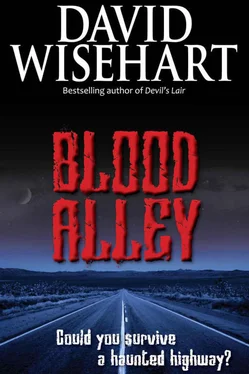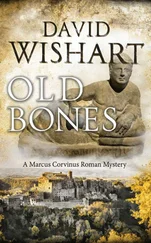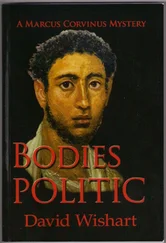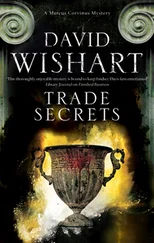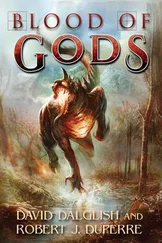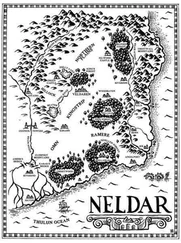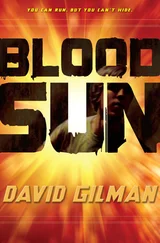The classic coupe sat silent.
Trevor took a few more steps across the broken concrete, crushing weeds that pushed up through the cracks. He looked in the window of the yellow coupe, then checked the red Chevy.
Both cars were empty.
Claire returned to the back office door. It was closed. A placard on the door read: “Manager.”
The light was on in the office.
Claire stepped up to the door and knocked.
“Hello?”
She waited for a dozen heartbeats, then turned the cold, cob-webbed handle, and pushed the door open.
No one was inside.
The overhead light was a bare bulb, but the cobwebs made it look like a chandelier. A wooden desk supported a manual typewriter and a rotary phone. Gray file cabinets lined the back wall. Golf trophies were arrayed on top. The wall by the desk boasted a framed diploma.
Claire stepped in, leaving footprints in the dust.
Hers were the only footprints. How long had it been since anyone was here? Years? Decades?
Who turned on the light?
She found the light switch by the door. It was covered with undisturbed cobwebs. With her sleeve she wiped away the thin, sticky filaments. She flicked the switch to the off position.
The light stayed on.
Wrong switch?
She looked for another switch, but didn’t see one.
It didn’t matter. She came in to find a phone, and there was a phone on the desk. An old rotary. If the lights worked, maybe the phone did too.
Who’s paying the electric bill?
Claire pushed the thought aside and went to the phone. She picked up the receiver and held it an inch from her ear, but heard no dial tone.
Disconnected?
Following the phone cord to the wall, she discovered that the end of the cord was frayed, as if gnawed by a rodent.
Claire returned the receiver to its cradle and opened the top desk drawer. She found pens and pennies and nickels. She picked out the shiniest penny from the loose change. The back face showed two stocks of wheat.
Wheat penny. She knew they didn’t make those anymore. The front face showed President Lincoln, and was dated 1929. Stock market crash . It was all she’d learned about 1929. The coin was very old, but looked freshly minted. Might be worth something.
She tucked it in her pocket.
Claire closed the top desk drawer and tried the side drawers. Inside she found, among various other files, a folder with news clippings from the Los Angeles Times, Palmdale Post, and South Antelope Valley Press . Mixed in with reviews and articles about the Last Stop Car Hop were reports of accidents on the highway. She recognized some of articles from the memorial wall at Dinah’s Diner.
One of the headlines caught her eye: “Fowler’s Last Stand.”
She unfolded the clipping. It was the front page of the Palmdale Post, dated September 5, 1933. Under the headline was a large black-and-white photo showing a farmhouse surrounded by cops. Four policemen aimed rifles at the front door of the house.
Intense.
The caption read: “Local police surround Fowler residence, moments before the shootout.”
Two other headlines screamed from the front page: “Heartbreak and Horror at Fowler Farm” and “Locals Leery of Lunar Eclipse.”
Claire’s eyes were drawn to the first article, which began:
In the shocking aftermath of the Fowler shootout, authorities are now piecing together clues as to the secret life of highway obstructionist Eldritch Fowler, a life of murder, rape, and incest—
The silence was shattered by a burst of music. It blared from outside the room—from the hallway or the dining area or the parking lot.
It was Frankie Lamarque, singing:
I met my girl by the cherry tree
We took it nice and slow
I asked my girl to marry me
But her old man said no…
Claire guessed it was blasting from someone’s car, but Trevor wouldn’t play that song.
Someone else is here.
Tucking the news clipping into her pocket, she hurried out of the office, down the hall, and back to the dining area.
The jukebox was now turned on, and playing way too loud.
Claire covered her ears. She went to the jukebox and searched for a volume knob, but couldn’t find one. She looked through the glass. A 45 rpm vinyl record spun inside. The label read: “Frankie Lamarque, Last Stop Car Hop.”
Polish the chrome
Put down the top
We’re leaving home
Drive till we drop
To the Last Stop Car Hop
Last Stop Car Hop
Claire grabbed the back of the machine. The jukebox was heavy. It took some effort, but she moved it another inch from the wall. She saw the electrical cord plugged in. She reached through the cobwebs and pulled the plug from the outlet.
The jukebox continued to play.
What the hell?
Trevor’s voice behind her: “Claire.”
She stood and saw Trevor near the door.
“How did you turn this on?”
“I didn’t,” he said. “I was outside. You find a phone?”
“Yeah, but it doesn’t work.”
A phone rang.
The sound came from the back office.
Claire hurried back down the hallway. Trevor follow, with the music still bouncing off the walls.
She entered the office and answered the phone.
“Hello?”
“ Claire… ” It sounded like the twin sisters in the fog.
“Who is this?”
“ We’ve been waiting for you— ”
She hung up.
Dakota cradled Ethan. She tried to comfort him as he shivered in her arms. He was damp with sweat and blood. She touched the skin of his cheek.
Cold as ice.
Ethan lay on his side, across the seat, with his back to the front of the car and his head in Dakota’s lap. The back of his leather jacket had been worn down to nothing. She could see the boney white of his spine, and moist red muscles where the skin should be.
Oh God, Baby.
She smelled urine.
It didn’t matter.
I’m so sorry.
Ethan would be clean again, and strong, and healthy, and beautiful, once they got him to a hospital.
“I’m not going to let you die,” Dakota said aloud, because he needed to hear it, because she needed to hear it, though she worried it was yet another promise she couldn’t keep.
She heard a crackling outside.
What is that?
It sounded like a PA system turning on, like those ancient outdoor speakers they had at school.
Where are we?
They were parked somewhere on the desert highway—
Blood Alley.
—past the bridge—
Destroyed.
—heading for Cedarview.
Too far.
How much further? She didn’t know. They didn’t have a map, and their phones didn’t work here.
Why are we parked?
Since leaving the bridge, she had barely paid attention to anything but Ethan.
We should be moving.
Nothing else seemed important now.
Why aren’t we moving?
Nothing else seemed real.
Where’s Trevor?
She glanced out the window. Trevor had parked at some dusty old diner. Light flickered from a neon sign, and music played inside, but the place seemed completely run down. She saw a row of speaker boxes, one for each parking stall.
The Hummer was parked next to post with a two-way speaker box mounted on it. The speaker was outside the driver’s window.
Two other cars were parked at the diner. One was red and the other yellow. They were old cars, like on TV. She didn’t know much about old cars. But she knew one thing. Cars had drivers.
Читать дальше
